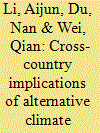|
|
|
Sort Order |
|
|
|
Items / Page
|
|
|
|
|
|
|
| Srl | Item |
| 1 |
ID:
176695


|
|
|
|
|
| Summary/Abstract |
There are overwhelming proofs that world-wide carbon emission profiles have been substantially shaped by carbon leakage through international trade. However, it has been unclear how structure and functions of the global carbon transfers evolve in terms of a complex network. Therefore, this study applies a series of network tools to depict the evolution features of the global carbon flow network from 1995 to 2011 as supported by a systems multi-regional input-output analysis. At global level, the network density increases essentially, indicating the widely expanding carbon leakages among economies. The increasingly distinct scale-free distribution for cumulative degree/weighted degree implies the network's intensified heterogeneity structure. At regional level, a new tripartite cluster structure has been identified by the three gradually stabilized communities centered on USA, China and Europe. At national level, the evolution for all economies' roles, especially two prominent groups (i.e. G8 and BRICS), is enunciated by coreness in context of the core-periphery structure, highlighting the significance of monitoring core economies' carbon emission flows. The results urge the need to shift from local carbon mitigation in silos to global collective and inclusive governance. Regional cluster structure's identification highlights the urgency for multinational cooperation on emission mitigation within the three newly formulated communities.
|
|
|
|
|
|
|
|
|
|
|
|
|
|
|
|
| 2 |
ID:
132607


|
|
|
|
|
| Publication |
2014.
|
| Summary/Abstract |
Because of worldwide growing concerns about global climate change, great interest has been expressed in the potential of alternative climate policies to reduce global carbon emissions. In this paper, we compare cross-country implications of alternative climate policies, including unilateral and multilateral climate policies. Our main findings are as follows. Firstly, there are large differences in cross-country effects of alternative unilateral climate policies, when the same given carbon emission reductions are achieved in each abating country respectively. Meanwhile, cross-border externalities undermine efficiency of unilateral climate policies. Secondly, there are significant differences in cross-country implications of alternative multilateral climate policies, when the same global emission reductions are allocated in several different ways among abating countries. Thirdly, it is difficult to reach a stable global climate treaty, since any abating country has the incentive to argue for small carbon emission reductions. Finally, multilateral climate policies can reduce the negative impacts of cross-border externalities, but cannot cure all cross-border externalities. Looking ahead, it will be a great policy challenge for the world to reduce carbon emissions in a cost-effective way.
|
|
|
|
|
|
|
|
|
|
|
|
|
|
|
|
|
|
|
|
|